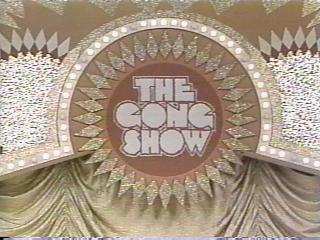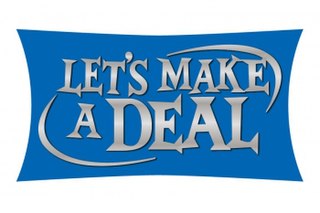Related Research Articles

A game show is a genre of broadcast viewing entertainment where contestants compete for rewards. The shows are typically directed by a host, who explains the rules of the game as well as commentating and narrating where necessary. The history of the game shows dates back to the late 1930s when both radio and television game shows were broadcast. The genre became popular in the United States in the 1950s, becoming a regular feature of daytime television.

The Mickey Mouse Club is an American variety television show that aired intermittently from 1955 to 1996 and returned to social media in 2017. Created by Walt Disney and produced by Walt Disney Productions, the program was first televised for four seasons, from 1955 to 1959, by ABC. This original run featured a regular, but ever-changing cast of mostly teen performers. ABC broadcast reruns weekday afternoons during the 1958–1959 season, airing right after American Bandstand. The show was revived three times after its initial 1955–1959 run on ABC, first from 1977 to 1979 for first-run syndication as The New Mickey Mouse Club, then from 1989 to 1996 as The All-New Mickey Mouse Club airing exclusively on cable television's The Disney Channel, and again in 2017 with the moniker Club Mickey Mouse airing exclusively on internet social media. It ended in 2018.

The Weakest Link is a British television quiz show, mainly broadcast on BBC Two and BBC One. It was devised by Fintan Coyle and Cathy Dunning and developed for television by the BBC Entertainment Department. The game begins with a team of nine contestants, who take turns answering general knowledge questions within a time limit to create chains of nine correct answers in a row. At the end of each round, the players then vote one contestant, "the weakest link", out of the game. After two players are left, they play in a head-to-head penalty shootout format, with five questions asked to each contestant in turn, to determine the winner.

Hollywood Squares is an American game show in which two contestants compete in a game of tic-tac-toe to win cash and prizes. The show piloted on NBC in 1965 and the regular series debuted in 1966 on the same network. The board for the game is a 3 × 3 vertical stack of open-faced cubes, each occupied by a celebrity seated at a desk and facing the contestants. The stars are asked questions by the host and the contestants judge the truth of their answers to gain squares in the right pattern to win the game.

Match Game is an American television panel game show that premiered on NBC in 1962 and has been revived several times over the course of the last six decades. The game features contestants trying to match answers given by celebrity panelists to fill-in-the-blank questions. Beginning with the CBS run of the 1970s, the questions are often formed as humorous double entendres.

The Gong Show is an American amateur talent contest franchised by Sony Pictures Television to many countries. It was broadcast on NBC's daytime schedule from June 14, 1976, through July 21, 1978, and in first-run syndication from 1976 to 1980 and 1988 to 1989, and was revived in 2017 for broadcast on ABC. The show was created and originally produced by Chuck Barris, who also served as host for the NBC run and from 1977 to 1980 in syndication. Its most recent version was executive-produced by Will Arnett and hosted by Tommy Maitland, a fictional character performed by Mike Myers. The Gong Show is known for its absurdist humor and style, with the actual competition secondary to the often outlandish acts presented; a small cash prize has typically been awarded to each show's winner.

Family Feud is an American television game show created by Mark Goodson. It features two families who compete to name the most popular answers to survey questions in order to win cash and prizes.
Broadcast syndication is the practice of content owners leasing the right to broadcast television shows and radio programs to multiple television stations and radio stations, without going through a broadcast network. It is common in the United States where broadcast programming is scheduled by television networks with local independent affiliates. Syndication is less widespread in the rest of the world, as most countries have centralized networks or television stations without local affiliates. Shows can be syndicated internationally, although this is less common.

Let's Make a Deal is a television game show that originated in the United States in 1963 and has since been produced in many countries throughout the world. The program was created and produced by Stefan Hatos and Monty Hall, the latter serving as its host for nearly 30 years.

Name That Tune is an American television music game show. Originally created and produced by orchestra conductor Harry Salter and his wife Roberta Semple Salter, the series features contestants competing to correctly identify songs being played by an on-stage orchestra or band.
To Tell the Truth is an American television panel show in which four celebrity panelists are presented with three contestants and must identify which is the "central character" whose unusual occupation or experience has been read aloud by the show's moderator/host. When the panelists question the contestants, the two impostors may lie whereas the "central character" must tell the truth. The setup adds the impostor element to the format of What's My Line? and I've Got a Secret.

Password is an American television game show in which two teams, each composed of a celebrity player and a contestant, attempt to convey mystery words to each other using only single-word clues, in order to win cash prizes.

Tattletales is an American game show produced by Goodson-Todman Productions in association with Fremantle. The program had two runs on the CBS daytime schedule between February 1974 and June 1984. It was hosted by Bert Convy, with several announcers including Jack Clark, Gene Wood, Johnny Olson and John Harlan providing the voiceover at various times. Wood was the primary announcer during the show's first run, and Olson was announcing during the 1980s.
Tommy Hanlon Jr. was an American-born actor, comedian, television host and circus ringmaster, notable for his career in Australia after emigrating there in 1959, where he became a Gold Logie-award-winning media personality, in 1962. Hanlon was notable for his early television appearances on daytime television and as host of the Australian version of United States game show It Could Be You.
Winner Take All is an American radio-television game show that ran from 1946 to 1952 on CBS and NBC. It was the first game show produced by the Mark Goodson-Bill Todman partnership. The series was originally hosted by Ward Wilson, but is best known for being the first game hosted by Bill Cullen.

The Price Is Right is an American game show produced by Mark Goodson-Bill Todman Productions, wherein contestants placed successive bids on merchandise prizes with the goal of bidding closest to each prize's actual retail price without surpassing it. The show was a precursor to the current and best-known version of the program, which premiered in 1972 on CBS's daytime schedule. It makes The Price Is Right one of only a few game show franchises to have aired in some form across all three of the Big Three television networks.
The Price Is Right is a television game show franchise created by Bob Stewart, originally produced by Mark Goodson and Bill Todman; currently it is produced and owned by Fremantle. The franchise centers on television game shows, but also includes merchandise such as video games, printed media, and board games. The franchise began in 1956 as a television game show hosted by Bill Cullen and was revamped in 1972, initially as "The New Price Is Right." This version was originally hosted by Bob Barker. Drew Carey has hosted the program since 2007.
Wheel of Fortune was an American game show which ran from 1952 to 1953 on CBS in both daytime and nighttime. It was presented by Todd Russell and narrated by Hal Sims.

Lost television broadcasts are mostly those early television programs which cannot be accounted for in studio archives usually because of deliberate destruction or neglect.
The Tommy Hanlon Show is an Australian television series which aired 1967 to 1968 on the Nine Network. It was a game show similar to Let's Make a Deal, and aired in a daytime half-hour time-slot. As the title suggests, it was hosted by Tommy Hanlon Jr., an American who found popularity with Australian viewers during the 1960s.
References
- ↑ Bednall, John (9 February 1967). "'I'm sick of the whole business'". The Age . p. 2. Retrieved 15 September 2014.
- ↑ "Search The Collection". National Film and Sound Archive . Retrieved 14 October 2023.